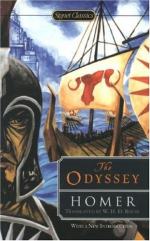And Peisistratus, son of Nestor, answered him, saying: ’Menelaus, son of Atreus, fosterling of Zeus, leader of the host, assuredly this is the son of that very man, even as thou sayest. But he is of a sober wit, and thinketh it shame in his heart as on this his first coming to make show of presumptuous words in the presence of thee, in whose voice we twain delight as in the voice of a god. Now Nestor of Gerenia, lord of chariots, sent me forth to be his guide on the way: for he desired to see thee that thou mightest put into his heart some word or work. For a son hath many griefs in his halls when his father is away, if perchance he hath none to stand by him. Even so it is now with Telemachus; his father is away, nor hath he others in the township to defend him from distress.’
And Menelaus of the fair hair answered him, and said: ’Lo now, in good truth there has come unto my house the son of a friend indeed, who for my sake endured many adventures. And I thought to welcome him on his coming more nobly than all the other Argives, if but Olympian Zeus, of the far-borne voice, had vouchsafed us a return over the sea in our swift ships,—that such a thing should be. And in Argos I would have given him a city to dwell in, and stablished for him a house, and brought him forth from Ithaca with his substance and his son and all his people, making one city desolate of those that lie around, and are in mine own domain. Then ofttimes would we have held converse here, and nought would have parted us, the welcoming and the welcomed, {*} ere the black cloud of death overshadowed us. Howsoever, the god himself, methinks, must have been jealous hereof, who from that hapless man alone cut off his returning.’
{* Mr. Evelyn Abbott of Balliol College has suggested to us that [Greek] and [Greek] are here correlatives, and denote respectively the parts of host and of guest. This is sufficiently borne out by the usage of the words elsewhere.}
So spake he, and in the hearts of all he stirred the desire of lamentation. She wept, even Argive Helen the daughter of Zeus, and Telemachus wept, and Menelaus the son of Atreus; nay, nor did the son of Nestor keep tearless eyes. For he bethought him in his heart of noble Antilochus, whom the glorious son of the bright Dawn had slain. Thinking upon him he spake winged words:
’Son of Atreus, the ancient Nestor in his own halls was ever wont to say that thou wert wise beyond man’s wisdom, whensoever we made mention of thee and asked one another concerning thee. And now, if it be possible, be persuaded by me, who for one have no pleasure in weeping at supper time—the new-born day will right soon be upon us. {*} Not indeed that I deem it blame at all to weep for any mortal who hath died and met his fate. Lo, this is now the only due we pay to miserable men, to cut the hair and let the tear fall from the cheek. For I too have a brother dead, nowise the meanest of the Argives, and thou art like to have known him, for as for me I never encountered him, never beheld him. But men say that Antilochus outdid all, being excellent in speed of foot and in the fight.’




